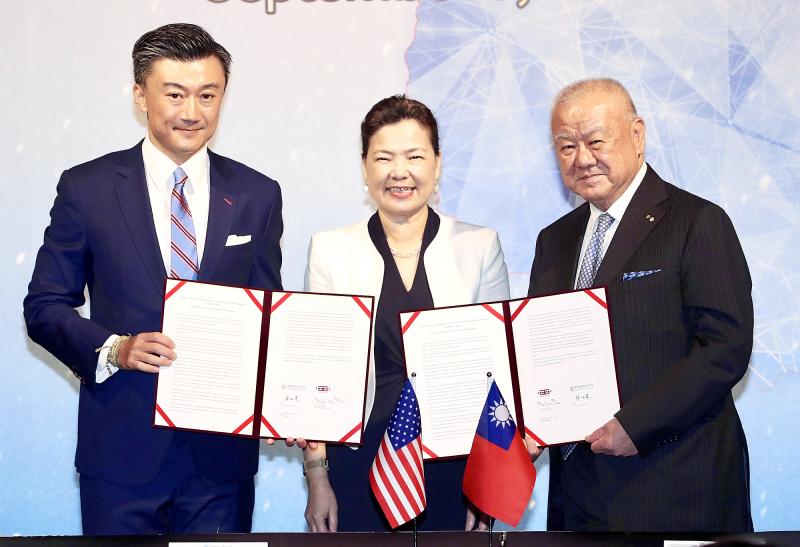The Taipei-based Chinese National Association of Industry and Commerce (CNAIC, 工商協進會) and the American Chamber of Commerce in Taipei (AmCham) yesterday urged the Taiwanese and US governments to begin negotiating a bilateral trade agreement.
The call came after President Tsai Ing-wen (蔡英文) on Aug. 28 announced that Taiwan would ease restrictions on US beef and pork imports.
“The move eliminates what had been a major obstacle to entering into such an agreement,” the two organizations said a joint statement.

Photo: CNA
They have long pushed for such an agreement.
Taiwan and the US are among each other’s most important trading partners and both support fair, transparent and mutually beneficial trade relations, the statement said.
In addition, the two nations adhere to democratic values, are dedicated to the rule of law and intellectual property rights, and are devoted to upholding peace and stability in the Indo-Pacific region, the statement said.
Recent developments support a bilateral trade agreement, it said, adding that a widespread reconfiguration of global investment and procurement practices is under way amid increasing concern about the security of supply chains.
As a result, the level of integration between the Taiwanese and US economies has grown rapidly, especially with regards to collaboration between companies in the critical area of semiconductors and other advanced technologies.
In the first half of this year, Taiwan moved up to ninth place on the list of US trading partners, while the US has long ranked as Taiwan’s second-largest trading partner, accounting for about 15 percent of Taiwan’s exports.
The actual share would be higher if shipments to the US via third countries were factored in, government data showed.
Bilateral trade totaled about US$43 billion in the first six months, AmCham said.
Simulations by the Taipei-based Chung-Hua Institution for Economic Research (中華經濟研究院) show that both nations would benefit substantially from a bilateral trade agreement in terms of tariff reductions and liberalization of the service sector.
An agreement on digital trade rules would provide additional gains, the statement said.
Bilateral trade agreement negotiations would also present an ideal opportunity to resolve any remaining trade issues between the two nations, encouraging increases in the flow of trade and investment in both directions, it said.
A trade agreement would also further the common objectives of maintaining regional peace and stability in the Indo-Pacific, the statement said.
Taiwan is the type of reliable partner the US needs for economic and security reasons during this period of flux and adjustment to a “new normal,” AmCham said.
CNAIC chairman Lin Por-fong (林伯豐) and AmCham chairman C.W. Chin (金奇偉) signed the statement at a ceremony witnessed by Minister of Economic Affairs Wang Mei-hua (王美花).
Before the ceremony, Lin told reporters that Taiwan’s representatives should prioritize the nation’s interests when negotiating a trade agreement with the US, and the two countries should begin talks on equal footing.
Wang said that pork and beef imports could help address trade imbalances between Taiwan and the US.

Taiwan’s long-term economic competitiveness will hinge not only on national champions like Taiwan Semiconductor Manufacturing Co. (TSMC, 台積電) but also on the widespread adoption of artificial intelligence (AI) and other emerging technologies, a US-based scholar has said. At a lecture in Taipei on Tuesday, Jeffrey Ding, assistant professor of political science at the George Washington University and author of "Technology and the Rise of Great Powers," argued that historical experience shows that general-purpose technologies (GPTs) — such as electricity, computers and now AI — shape long-term economic advantages through their diffusion across the broader economy. "What really matters is not who pioneers

In a high-security Shenzhen laboratory, Chinese scientists have built what Washington has spent years trying to prevent: a prototype of a machine capable of producing the cutting-edge semiconductor chips that power artificial intelligence (AI), smartphones and weapons central to Western military dominance, Reuters has learned. Completed early this year and undergoing testing, the prototype fills nearly an entire factory floor. It was built by a team of former engineers from Dutch semiconductor giant ASML who reverse-engineered the company’s extreme ultraviolet lithography (EUV) machines, according to two people with knowledge of the project. EUV machines sit at the heart of a technological Cold

TAIWAN VALUE CHAIN: Foxtron is to fully own Luxgen following the transaction and it plans to launch a new electric model, the Foxtron Bria, in Taiwan next year Yulon Motor Co (裕隆汽車) yesterday said that its board of directors approved the disposal of its electric vehicle (EV) unit, Luxgen Motor Co (納智捷汽車), to Foxtron Vehicle Technologies Co (鴻華先進) for NT$787.6 million (US$24.98 million). Foxtron, a half-half joint venture between Yulon affiliate Hua-Chuang Automobile Information Technical Center Co (華創車電) and Hon Hai Precision Industry Co (鴻海精密), expects to wrap up the deal in the first quarter of next year. Foxtron would fully own Luxgen following the transaction, including five car distributing companies, outlets and all employees. The deal is subject to the approval of the Fair Trade Commission, Foxtron said. “Foxtron will be

INFLATION CONSIDERATION: The BOJ governor said that it would ‘keep making appropriate decisions’ and would adjust depending on the economy and prices The Bank of Japan (BOJ) yesterday raised its benchmark interest rate to the highest in 30 years and said more increases are in the pipeline if conditions allow, in a sign of growing conviction that it can attain the stable inflation target it has pursued for more than a decade. Bank of Japan Governor Kazuo Ueda’s policy board increased the rate by 0.2 percentage points to 0.75 percent, in a unanimous decision, the bank said in a statement. The central bank cited the rising likelihood of its economic outlook being realized. The rate change was expected by all 50 economists surveyed by Bloomberg. The